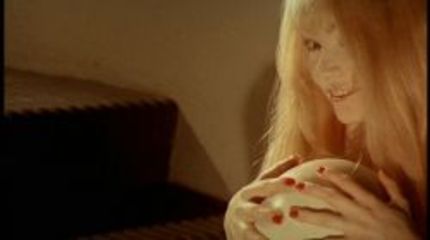Tribeca Film Festival (TFF): TOBY DAMMIT Review

By now, the films of Federico Fellini have become synonymous with spiritual and sexual caricatures, grotesque personal carnivals that conflate the everyday with ornate and fantastic tableaux of surreal decadence. His later surrealist works are unquestionably as convoluted as they are dazzling to behold. In the best of them, the chaotic pageantry he methodically orchestrates overwhelms the viewer and takes them on a journey through a playfully tortured imagination. To think of a Fellini film shorter than two-hours long would be like expecting a Bollywood film to be shorter than 150 minutes. Clocking in at a brisk 37 minutes, Toby Dammit, Fellini’s contribution to the 1968 omnibus film Spirits of the Dead, is a minor epic and a major source of cult and critical affection. For proof, look to Tim Burton, whose Beetlejuice swipes the haunted look of Fellini’s already ghastly protagonist and contorts it past its breaking point.
Trumping both Louis Malle and Roger Vadim’s contributions, Dammit is considered to be head-and-shoulders the best segment in Spirits—Vincent Canby called it “a short movie but a major one.” If Vincent Canby loves it, you know that it’s just shy of being canonized as an unimpeachable cinematic icon. I can’t help but recall his dead-on criticism of Alejandro Jodorowsky’s El Topo, where he provided a critically engaging and fascinating commentary on Jodorowsky’s otherwise stupefying polemic. Despite the praise, Dammit nothing new from Fellini, except that this time he’s (very loosely) basing his material on a pre-existing text—Edgar Allen Poe’s Never Bet the Devil Your Head—and while the story is set in the Roman filmmaking industry, his protagonist is a washed-up British actor, making a familiar trip to the hyperbolic and semi-seriously intimate Rome of his previous films almost foreign. Rome is still a bewitching nightmare populated by plague victims and mannequins and Dammit is definitely a Fellini hero, a disillusioned, sickly, washed-up opportunist with a secret death wish hidden to even him. What makes it a great cult find is its appeal as a distillation of all that Fellini has said before in a compact, relatively light descent into Dammit’s personal nightmare.
Toby Dammit (Terrence Stamp) peels himself off of the plane to Rome only to be greeted by a hazy, reddish-orange sky and a barrage of everyone from studio handlers to nuns to photographers. Still in his “impish good-looks” phase, Stamp alternates between making Dammit seem like a phantasm by day and a junkie by night. On the ride from the airport, the studio suits regale him with the plot of the next project he’s working on, “a Christian western…a cross between Pasolini and John Ford,” making El Topo sound positively quaint. Dammit could care less just as long as he gets what’s his, namely a sleek red Ferrari. And that’s not even his deal with the literal devil.
Fellini’s worlds have always toyed with the notion of his boredom and utter contempt for anything but the most obnoxious, debased, unwholesome and disease-stricken. In order to embrace the carnival in his worlds, you have to accept the fact that not only is ugly pretty and down up, but that the most foreign and alien thing of all is the most familiar. By that token, anyone viewing Dammit after having submerged themselves in his most well-known and sometimes intentionally unbearably overdone standard titles will at once be delighted and then almost instantly bored with Dammit. While it celebrates the fantastic and the personal in equal measure, right up until its bloody race across the finish line Dammit’s farewell ride feels like riding shotgun in an infernal rocket that only looks like a sports car. Even Fellini’s last film Voice of the Moon, his dream of a schizophrenic that can speak to the moon as it slowly becomes co-opted by trashy consumerist society, is both buoyed and bogged down by its own sense of grandiosity. Who else could play an escaped romantically and mentally ill patient than Robert Benigni? Who else could declare the coming of the imaginary apocalypse in his final, most urgent and still most obscure film—Voice is one of only two of his films still unavailable without English subtitles—than a visionary whose films celebrate their hallucinatory boredom and prophetic aloofness?
Having existed for the most part so far out of time, Dammit has become a curio for anyone that needs reminding of the triumphal and undeniably bizarre hold of a “new” Fellini film. Even when he was at his most self-indulgent (Satyricon and Roma), Fellini knew he was an institution because people were crowing his genius all about him, making his coy annoyance a primary focus of his ur-real self-portraits of the damned. He gets bored after he’s gotten off and so will the audience after Dammit’s spell has worn off, though the feeling of exhilaration will linger on.







